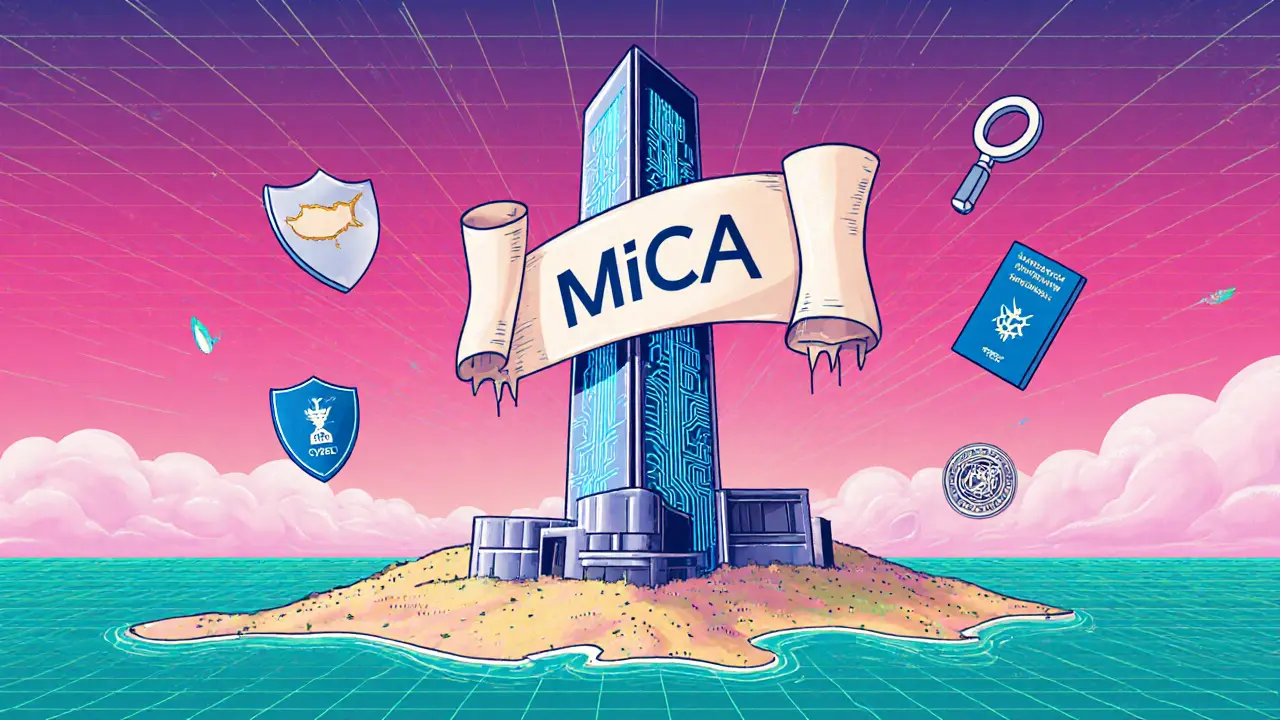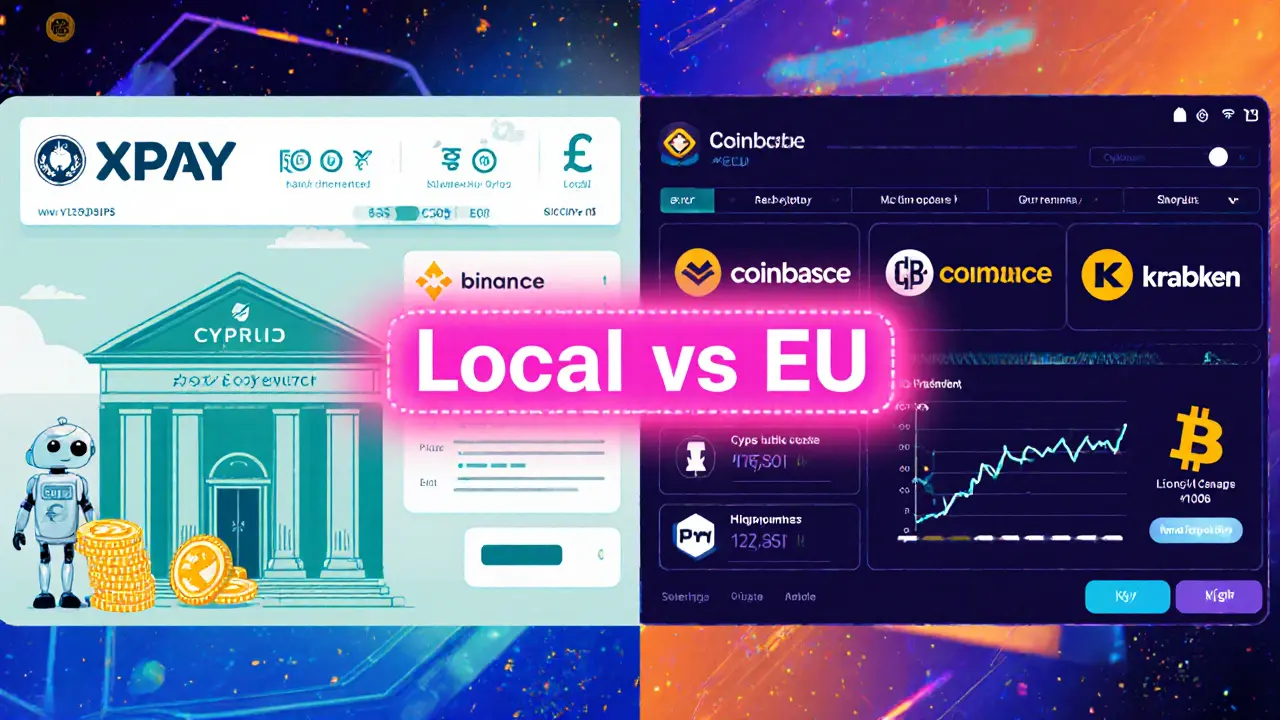How Cypriots Access Crypto Exchanges in 2025: Rules, Methods & Top Platforms
 Jul, 11 2025
Jul, 11 2025
Crypto Transaction Fee Calculator
Results will appear here after calculation
If you’re a Cypriot curious about buying, selling, or swapping digital coins, the first question is: how do you actually get onto an exchange? The short answer is that you can, but you need to follow a clear set of rules that keep everything legal and safe. Below we break down the whole process - from the regulator that watches the market, to the paperwork you’ll fill out, the types of platforms you can use, and the tax side of things.
Regulatory Landscape: Who’s in Charge?
CySEC is the Cyprus Securities and Exchange Commission, the main authority that licenses and supervises crypto‑asset service providers (CASPs) on the island. Since the EU’s Markets in Crypto‑Assets (MiCA) regulation took effect in June 2023, CySEC has been aligning local rules with EU standards. The goal is simple: make sure every exchange that serves Cypriot users follows the same consumer‑protection, anti‑money‑laundering (AML), and counter‑terrorist‑financing (CFT) rules as banks and traditional brokers.
CySEC stopped accepting new national‑law CASP applications in early 2024, because the country is moving fully to the MiCA framework by the end of that year. What this means for you is that any exchange you pick must already be registered either under the old CySEC register or under the new EU‑wide MiCA licence.
Who Can Offer Services? The Role of CASPs
Crypto‑Asset Service Provider (CASP) is the legal term for any company that offers exchange, custody, trading or advisory services for crypto‑assets in Cyprus. A CASP must have a licence from CySEC, comply with MiCA, and meet strict AML/CFT obligations. This licence is a passport that lets the provider operate not just in Cyprus but across all EU member states.
Because of the passport effect, many big EU‑based platforms - like Binance, Coinbase, Kraken, and Bitstamp - are already eligible to serve Cypriot customers, provided they hold a MiCA licence. At the same time, a handful of local firms have secured CySEC licences and market themselves as “Cyprus‑focused” exchanges, often offering support in Greek and Euro‑centric payment options.
Getting Started: KYC and AML Checks
Before you can move any money, the exchange will ask you to complete a Know‑Your‑Customer (KYC) process. The threshold is €1,000: any transaction above that amount requires you to verify your identity with a government‑issued ID, a selfie, and proof of address. The KYC data is stored securely and shared with the Unit for Combating Money Laundering (MOKAS) if the platform detects suspicious activity.
During the AML check, the exchange runs you against EU and UN sanctions lists, screens for politically exposed persons (PEPs), and keeps an audit trail of all transactions. If anything looks off, the platform must file a Suspicious Transaction Report (STR) with MOKAS. For most everyday users, this just means completing the online verification forms and waiting a few minutes for approval.

Choosing a Platform: Local Licensed vs. EU‑Wide Exchanges
In practice, Cypriots split between two main categories of exchanges:
| Feature | Local CASP‑Licensed | EU‑Wide (MiCA‑licensed) |
|---|---|---|
| Regulatory body | CySEC (national licence) | CySEC + EU MiCA passport |
| KYC threshold | €1,000 (standard) | €1,000 (standard) |
| Supported fiat currencies | EUR, GBP, Cyp £ | EUR, USD, GBP, others |
| Typical fees | 0.15‑0.25 % per trade | 0.10‑0.20 % per trade |
| Customer support language | Greek & English | English (multi‑language) |
| Speed of withdrawals | 1‑2 business days (bank transfer) | Instant (crypto) / 1 day (bank) |
| Examples | XPAY Crypto, CryptoBank Cyprus | Binance, Coinbase, Kraken, Bitstamp |
Both types are legal, but local exchanges often give you easier access to Euro‑based bank accounts and Greek‑language help desks. EU‑wide platforms usually have lower fees, more coin options, and faster crypto‑to‑crypto trades.
Popular Platforms and Payment Methods in Cyprus
Here’s a quick rundown of the most commonly used services among Cypriot traders as of 2025:
- Binance - Offers a full suite of spot, futures, and staking products. Supports SEPA Euro transfers, credit‑card purchases, and Apple/Google Pay.
- Coinbase - Known for a clean UI and strong security. Accepts Euro bank transfers and debit cards.
- Kraken - Good for margin trading and a wide range of fiat pairs. Uses SEPA and SWIFT for fiat deposits.
- Bitstamp - One of the oldest EU‑licensed exchanges, with low fees for high‑volume traders. Accepts Euro via bank transfer.
- XPAY Crypto - A local CySEC‑licensed platform that integrates directly with Cyprus banks, offers Greek‑language support, and focuses on retail investors.
Payment methods most often seen are SEPA Euro bank transfers (the cheapest), credit/debit cards (fast but higher fees), and increasingly, stable‑coin bridges where you move a Euro‑backed stablecoin into the exchange and trade from there.

Tax Implications: What You Need to Declare
Cyprus does not levy capital gains tax on the sale or exchange of cryptocurrencies, as long as the activity is not considered a professional trading business. That makes crypto trading attractive for many locals. However, if you receive crypto as income - for example, from mining, staking rewards, or a salary paid in tokens - the fair market value is treated as ordinary income and taxed at the personal income tax rates (up to 35 %).
Every year, you must keep detailed records of purchase dates, amounts, and sale proceeds. The Cyprus Tax Department may request these records during an audit, so using an exchange that provides downloadable CSV statements is a smart move.
Practical Tips and Common Pitfalls
- Check the exchange’s licence status on the CySEC CASP register before signing up.
- Use a strong, unique password and enable two‑factor authentication (2FA) - preferably a hardware token.
- Start with a small test deposit to verify that withdrawals work as expected.
- Avoid platforms that claim “no KYC” - they are either unlicensed or operating in a legal gray area.
- Keep a separate hardware wallet for long‑term storage; exchanges are great for trading, not for holding large sums.
By following these steps, you’ll be able to trade confidently while staying on the right side of Cyprus’s regulations.
Frequently Asked Questions
Do I need a CySEC licence to use an exchange?
No. The licence belongs to the exchange, not the user. You just need to confirm that the platform you choose is licensed and complies with AML/KYC rules.
Can I use a foreign exchange if it’s not based in Cyprus?
Yes, as long as the exchange holds a MiCA licence that covers the whole EU. Most major platforms meet this requirement.
What documents are required for KYC?
A government‑issued ID (passport or ID card), a selfie, and a recent utility bill or bank statement showing your address.
Is there a tax on crypto profits in Cyprus?
No capital gains tax on personal crypto trading profits. Tax applies only if the crypto is received as income or if you run a professional trading business.
What’s the fastest way to withdraw cash?
Convert crypto to a Euro‑stablecoin, send it to a SEPA‑compatible exchange, then initiate a SEPA transfer to your local bank - usually completed within one business day.
Susan Bari
October 24, 2025 AT 02:54Let’s be real-MiCA is just the EU’s way of pretending they control the internet. You think a regulation written by bureaucrats in Brussels actually stops anyone? The real crypto revolution happens in the shadows where KYC doesn’t exist. But sure, keep your ID selfie ready while the banks still own your life.
Sean Hawkins
October 24, 2025 AT 13:43For anyone new to this: the MiCA passport system is actually a huge win. It means you’re not stuck with sketchy local platforms that might vanish next year. Binance, Kraken, Coinbase-all these are audited, regulated, and legally obligated to protect your funds. If you're doing anything beyond gambling, stick with licensed CASPs. It’s not about trust-it’s about legal recourse.
Niki Burandt
October 25, 2025 AT 07:38lol at people still thinking ‘no KYC’ is a feature 😂
Kyle Waitkunas
October 25, 2025 AT 19:33They’re lying to you. CySEC? MiCA? It’s all a front. The real power isn’t in the licenses-it’s in the bank accounts. Every time you do a SEPA transfer, you’re giving your financial DNA to the same institutions that crashed the system in 2008. They’re using crypto regulation to build a digital ID prison. They’re watching your every trade. They’re mapping your behavior. And when the next ‘crisis’ hits? You’ll be the first to lose access. Don’t be fooled by the pretty UIs and low fees. This isn’t freedom. It’s surveillance with a blockchain veneer.
Marlie Ledesma
October 26, 2025 AT 02:16I just started trading last month and this guide actually helped me feel less overwhelmed. I was terrified of making a mistake with my first deposit, but knowing there’s a clear legal path made all the difference. Thanks for laying it out so clearly.
Daisy Family
October 26, 2025 AT 09:42XPAY Crypto? Sounds like a TikTok scam name 😴
Paul Kotze
October 26, 2025 AT 21:34Great breakdown. One thing to add: if you're in South Africa and want to access these platforms, most accept ZAR via P2P on Binance or Kraken. Just be careful with your local exchange rates-some traders inflate prices to compensate for currency volatility. Stick to reputable P2P vendors with high ratings.
Jason Roland
October 27, 2025 AT 01:15Why are we still debating whether to use local vs. EU platforms? The answer is simple: use both. Keep your small trades on XPAY for the Greek support and instant EUR transfers, then move larger positions to Kraken for lower fees and deeper liquidity. Diversify your access points-not your risk. And for god’s sake, use a hardware wallet. Exchanges are hotels, not vaults.
Chris Pratt
October 27, 2025 AT 08:30As someone who moved from Cyprus to the US, I can say this: the KYC process here is way more brutal than back home. In Cyprus, it took 10 minutes. In the States, they asked for my tax ID, bank statements from the last 6 months, and a notarized letter explaining why I’m buying crypto. I swear, if they asked for my childhood pet’s name next, I’d walk away.
Karen Donahue
October 27, 2025 AT 15:59Of course Cyprus has no capital gains tax. That’s why everyone there is rich and no one has a real job anymore. Crypto isn’t investing-it’s a tax loophole for people who can’t handle 9-to-5s. And now the whole EU is copying this dumb policy? Brilliant. Let’s just make it easy for every trust fund kid to turn $500 into a Lambo while the rest of us pay for infrastructure.
Bert Martin
October 28, 2025 AT 06:44Start small. Test withdrawals. Use 2FA. Read the terms. You don’t need to be a genius-you just need to be careful. This guide gives you everything you need. Don’t overcomplicate it.
Ray Dalton
October 29, 2025 AT 03:47One thing the post doesn’t mention: the difference between ‘custodial’ and ‘non-custodial’ access. Most platforms listed here hold your keys. That means if they get hacked or freeze your account, you’re screwed. If you’re holding more than a few hundred bucks, consider using a non-custodial wallet like Ledger or Trezor and connecting via WalletConnect. You trade through the exchange but keep control. It’s a little more work-but it’s the only way to actually own your crypto.
Peter Brask
October 29, 2025 AT 18:13MiCA? Ha! That’s just the Fed’s way of forcing everyone into the banking system. They know crypto is the only thing left that can’t be taxed, tracked, or controlled-so now they’re co-opting it. The ‘license’ they give to Binance? It’s a leash. Every transaction gets flagged. Every withdrawal gets logged. They’re not protecting you-they’re preparing for the day they shut it all down and say ‘we told you so.’
Trent Mercer
October 30, 2025 AT 15:55Let’s be honest-XPAY Crypto? That’s a glorified PayPal for crypto bros. If you’re using them, you’re probably not even trading-you’re just trying to avoid learning how to use a real exchange. And don’t get me started on ‘Cyp £’-that’s not even a real currency. Someone’s still stuck in 2008.
vonley smith
October 31, 2025 AT 03:26Just got my first SEPA withdrawal from Kraken today. Took 14 hours. No drama. No fees. Just clean, quiet money moving. If you’re new, start here. Skip the hype. Skip the memes. Just move slow, verify your ID, and let the system work for you. You don’t need to be a hacker to win.